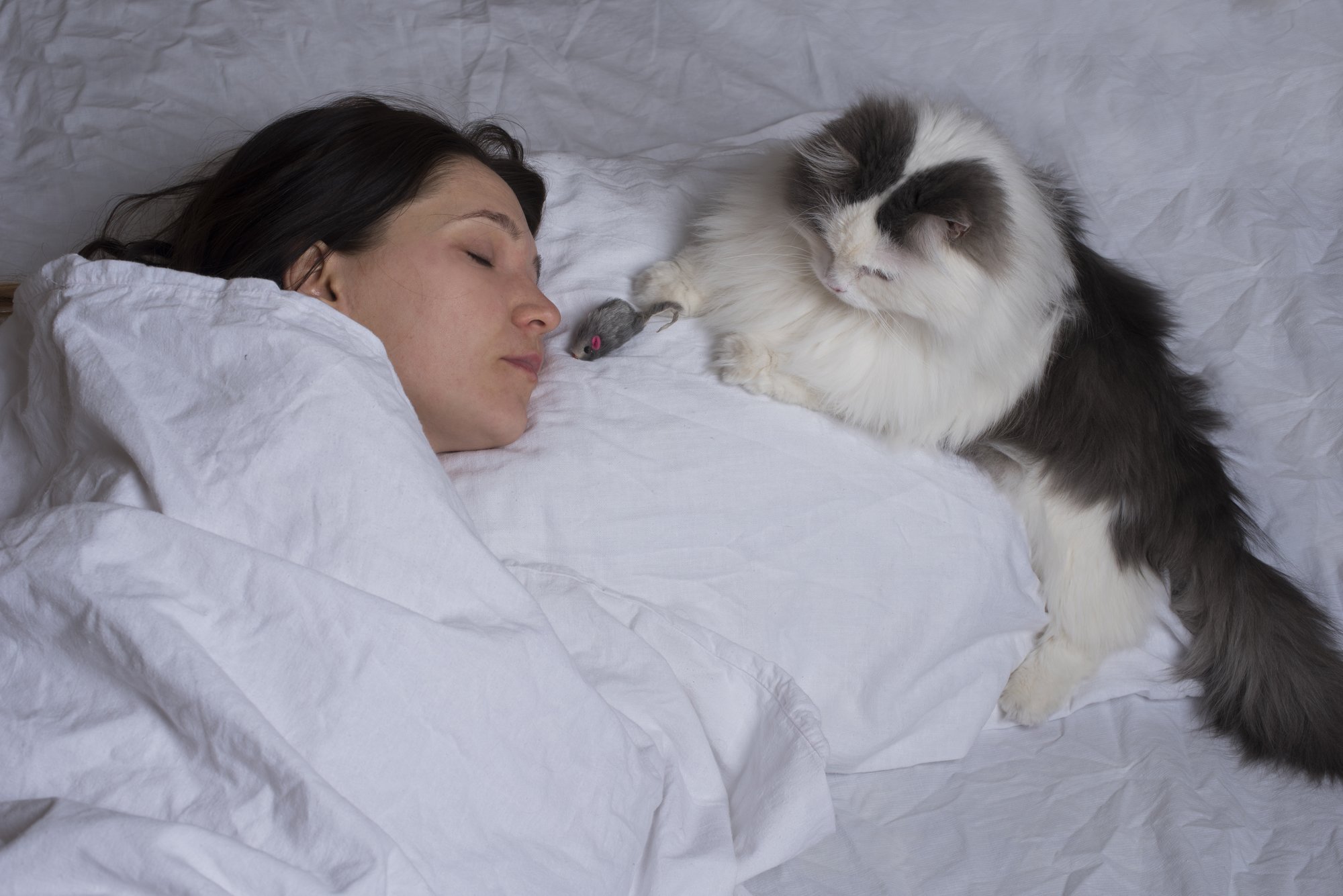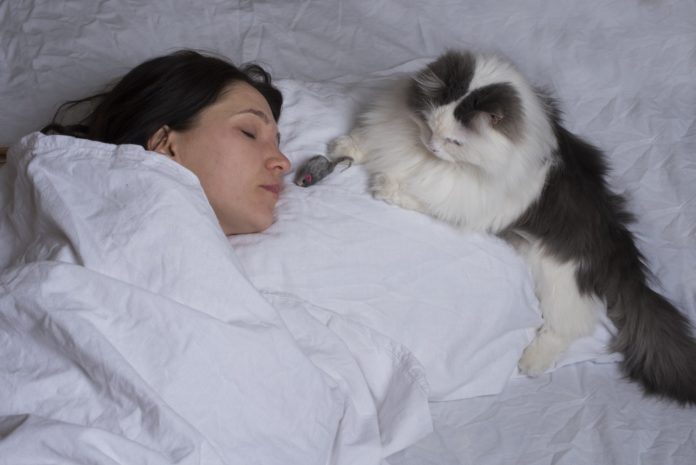You love your cat, but you also love a good night’s sleep, and her midnight acapella is not exactly the perfect lullaby. She may be meowing for attention, but it could also be because she needs or wants something, or an indication of a developing health problem.

Normal Behavior or a Problem?
Is nighttime meowing something that your cat has always done to one extent or another, or is it a new development? Sudden changes in a cat’s behavior often indicate a health problem or that something else is causing stress.
A new cat or kitten may cry out out at night because she is in a new environment and/or misses the company of cats that she was with before she moved in with you. Give her a week or two to settle in and get acclimated. Facial pheromones, such as Feliway, can help to calm your new cat, and playing with and interacting with her throughout the day will help her to bond to you and develop a sense of home.
Play
Young cats often want to play in the middle of the night. A burst of energy may possess your cat to pounce on your feet under the covers, drop toys on your sleeping face, or call to you to join in the fun as she races through the house. As adorable as she may be, resist these invitations or she will be encouraged to continue that behavior in the future.
Plan several play sessions throughout the day, especially in the evening. Encourage your cat with favorite toys and play until she loses interest or seems tired. You also can provide toys, such as a fuzzy ball, in a room away from your room for your cat to play with at night.
For cats who enjoy the company of other felines, adding another cat to your family can take some of the playmate pressure off you. Depending on your new dynamic duo’s play style, however, this plan could backfire and result in more noise at night as twice as many paws stomp around the house.
Shutting your cat out of the bedroom will prevent physical assaults, and the door will also dampen the sound of your cat’s play. You can encourage your cat to stay away from your bedroom door by laying down a material that she doesn’t like, such as a vinyl carpet runner pointy-side-up or double-sided tape. Motion-activated items that make noise can also keep your kitty away, but may also wake you up or scare your cat too much. The latter strategies should only be used in extreme cases in which all other efforts to keep a kitty occupied at night have failed.
Hunger
If your cat wakes you up at night asking for food, try mixing up your feeding routine by giving her meal just before bedtime. This has the added benefit of encouraging your cat to go to sleep, because many cats nap after they eat.
Another option is to purchase an automatic feeder that dispenses food at preset times. This allows you to space out your cat’s meals throughout the night and will teach her to wait by the feeder when she gets hungry rather than poking you. Make sure you keep track of how much she eats so that she doesn’t gain weight from extra meals.
Illness
If meowing at night is a new behavior, consider having her examined by your veterinarian, including at least basic bloodwork. Behavior changes in cats can indicate that something is wrong, and catching a developing problem early makes treatment easier. Bloodwork will evaluate kidney and liver function and can rule out other potential causes of this behavior, including hyperthyroidism.
Cognitive dysfunction syndrome, like human dementia, is common in senior cats, and meowing at night is a common symptom. Ask your veterinarian about cognitive dysfunction syndrome if nocturnal crying is a new behavior in your senior cat. Playing with and training your cat on a regular basis will help to keep her mind sharp, and supplements such as omega-3 fatty acids, vitamin E, and antioxidants may help. Your veterinarian may also prescribe an anti-anxiety medication such as fluoxetine if necessary. See our February 2018 article “When Kitty Battles Dementia,” which is available at catwatchnewsletter.com.
Stress
Think about any changes that may be causing your cat stress. Maybe you moved to a new apartment, or the upstairs neighbors got a dog who makes a lot of noise running around. Stress can cause your cat to become anxious, resulting in behavioral changes like meowing and pacing at night.
Try to address and minimize stress for your cat, and make sure that she is getting a balanced diet and plentyofexercise to encourage her to sleep through the night. She may also benefit from extra snuggle time and attention.
crazycolors | DepositPhotos

Nocturnal by Nature
Your fluffy friend is a descendent of nocturnal hunters. While our domestic cats have adjusted pretty well to their humans’ daylight-oriented lifestyles, cats are still often active at night. Your cat may get up several times throughout the night to eat, play, or just stroll through the house and make sure that everything is in order. This isn’t an issue if your cat goes about her evening activities quietly, but she may want you to be involved.




